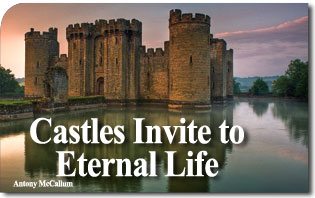 The works of Creation inspired the most sublime movements of love and adoration toward the Creator, God Our Lord in souls like Saint Francis of Assisi.
The works of Creation inspired the most sublime movements of love and adoration toward the Creator, God Our Lord in souls like Saint Francis of Assisi.
When men produce works imbued with a Catholic mentality and gently inspired by grace, the result is what the great Italian poet Dante Alighieri dubbed the “grandchildren of God,” as they are “children” of God’s children. These works can also elicit similar movements of wonder.
Since man has a body and lives on a material earth amid material objects such as buildings, bridges and roads, he necessarily lives in constant contact with them.
If these objects are imbued with a Catholic spirit, man would then live in continuous contact with sacral works that steadily and gently tell him about the joys of eternal bliss.
Such is the case with castles that arose in the Age of Light – the Middle Ages – a time when “the spirit of the Gospel permeated all institutions” in the words of Pope Leo XIII.
Is it not true that countless people would benefit if, instead of having to look at today’s plain and cold modern buildings, they could instead admire edifices built with another spirit ?
Who is more cultured?
1) An illiterate peasant who often visits castles in his region and learns to admire, love and respect them or …
2) another person living in conditions rather common today, who learns reading, writing, arithmetic and a little geography, but only has some contact with local, law and tax authorities through a bureaucracy, which is devoid of soul or spirit and impervious to the idea of God?
Is it not true that, though illiterate, a person who knows how to appreciate these medieval castles and buildings deep down understands things, including divine things, better than a literate person that is unable to appreciate them?
So we must recognize that there is another form of illiteracy, and a very modern one indeed.
It is not the one whereby one does not know how to read and write; it is an illiteracy of the spirit which disables one to admire the beauty and wonders of art, culture, and Christian civilization.

